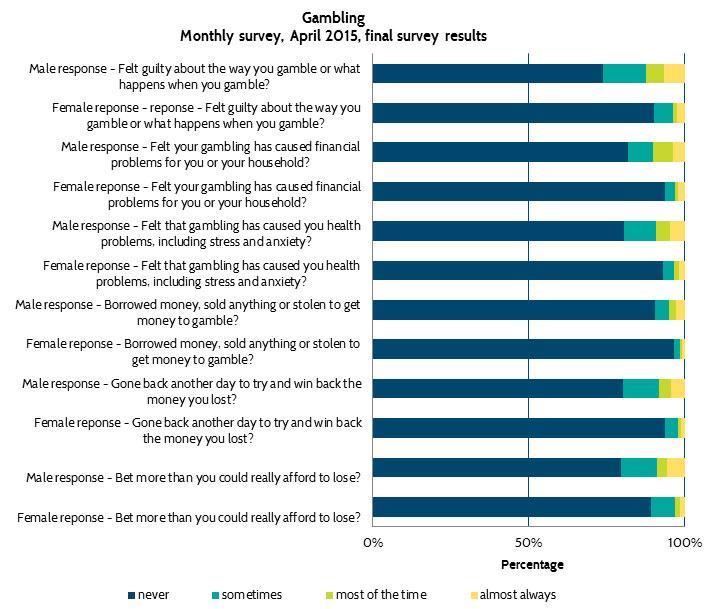Many Australians gamble as a form of entertainment. This might include an occasional bet on the horse races, buying a lottery ticket, playing the poker machines or a night out at the casino.
Introduction
Many Australians gamble as a form of entertainment. This might include an occasional bet on the horse races, buying a lottery ticket, playing the poker machines or a night out at the casino.
However, sometimes gambling has a negative impact on people’s lives and this is commonly termed ‘problem gambling’. Research also indicates that the actions of one problem gambler can negatively affect the lives of between five and 10 others. This means there are up to five million Australians who could be affected by problem gambling each year, including friends, family and employers of people with a gambling problem. Unfortunately only around 15 per cent of problem gamblers seek help.
The focus of Relationships Australia’s April online survey was to find out whether visitors to our website have been negatively affected by gambling. The six questions chosen for April’s survey were sourced from the nine-question Canadian Problem Gambling Index (Ferris and Wynne, 2001) whereby each response is scored as:
|
Response |
Score |
|
never |
|
|
sometimes |
|
|
most of the time |
|
|
almost always |
The score for each question is totalled, and the higher your total score, the greater the risk that your gambling is a problem. Scores of three or more on the full index of nine questions indicate moderate to high levels of problem gambling that may lead to negative consequences.
Previous research finds that…
- In 2009, 70 per cent of Australians participated in some form of gambling.
- Australians spent more than $19 billion on gambling in 2008-09; around $12 billion of which was spent playing on poker machines.
- Up to 500,000 Australians are at risk of becoming, or are, problem gamblers.
- The cost to the community of problem gambling is estimated to be at least $4.7 billion a year.
- Problem gamblers are around six times more likely to be divorced, four times more likely to have problems with alcohol and four times more likely to smoke daily than non-problem gamblers.
- Children with parents who are problem gamblers are up to 10 times more likely than children with non-gambling parents to become problem gamblers themselves.
Survey Results Analysis
More than 2,160 people responded to the Relationships Australia online survey in April. Just under three-quarters of survey respondents (74%) identified as female, suggesting the survey topic was slightly less appealing to women (or more appealing to men) than the previous survey about community participation.
As was the case for last month’s survey, more females than males responded in every age group (see figure below). Eighty-nine per cent of survey respondents were aged between 20‑59 years, with the highest number of responses collected for women aged between 30-39 years (inclusive).
The demographic profile of survey respondents remains consistent with our experience of the groups of people that would be accessing the Relationships Australia website.

Overall, between 74 and 97 per cent of survey respondents reported that they had never experienced any of the six gambling problems identified by the survey questions (see figure below). Men were less likely than women to report that they had never experienced any of the six gambling problems in the 12 month period preceding the survey, and correspondingly were more likely to report they almost always experienced gambling problems.
Twelve per cent of women and twenty-one per cent of men reported that they sometimes to almost always bet more than they could afford to lose. Six per cent of women and twenty-one per cent of men reported that they sometimes to almost always had gone back another day to try to win back the money they lost.
Few women and men reported that they had borrowed money, sold anything or had stolen to get money to gamble (3% and 10% respectively), while just over five per cent (7%) of women and almost twenty per cent (19%) of men felt that gambling had caused health problems, including stress and anxiety.
When asked about the effects of gambling on finances, six per cent of women and eighteen per cent of men reported that their gambling had caused financial problems for them or their household. Ten per cent of women and one-quarter of men sometimes to always feel guilty about their gambling or what happens when they gamble.

As noted above, the April survey included six of the nine questions that form the Problem Gambling Index and therefore respondents had less opportunity to reach a total score of 3 to 7 (moderate level of problems leading to some negative consequences) or 8 or more (problem gambling with negative consequences and a possible loss of control) than if they had been asked to complete the full nine questions. Despite this, in totalling the answers to the fewer number of questions included in the survey, around four per cent of women reported a moderate level of problems and three per cent a high level of problems, and eleven per cent of men reported a moderate level of problems and ten per cent a high level of problems. These results indicate problem gambling rates for males responding to the monthly online survey in excess of five to ten times the rates estimated for adults who are considered to have moderate to serious gambling problems in the Australian population.
References
Ferris, J. & Wynne, H. (2001). The Canadian Problem Gambling Index. Ottawa: Canadian Centre on Substance Abuse.
Thomas, S, and Jackson, A. (2008). Report to Beyondblue, Risk and Protective Factors: Depression and comorbidities in problem gambling.
The Problem Gambling Treatment and Research Centre. (2010). Children at risk of developing problem gambling.